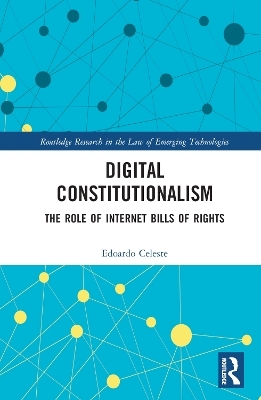
Digital Constitutionalism
Routledge (Verlag)
978-1-032-18905-5 (ISBN)
Over the past few years, a significant number of Internet bills of rights have emerged around the world. These documents represent non-legally binding declarations promoted mostly by individuals and civil society groups that articulate rights and principles for the digital society. This book argues that these initiatives reflect a change in the constitutional ecosystem. The transformations prompted by the digital revolution in our society ferment under a vault of constitutional norms shaped for ‘analogue’ communities. Constitutional law struggles to address all the challenges of the digital environment. In this context, Internet bills of rights, by emerging outside traditional institutional processes, represent a unique response to suggest new constitutional solutions for the digital age.
Explaining how constitutional law is reacting to the advent of the digital revolution and analysing the constitutional function of Internet Bills of Rights in this context, this book offers a global comparative investigation of the latest transformations that digital technology is generating in the constitutional ecosystem and highlights the plural and multilevel process that is contributing to shape constitutional norms for the Internet age.
Edoardo Celeste is Assistant Professor of Law, Technology and Innovation at Dublin City University, Ireland. He is the Coordinator of the DCU Law and Tech Research Cluster and the Programme Director of the European Master in Law, Data and Artificial Intelligence.
Table of Contents
1 – Introduction *
2 – A new constitutional moment *
Constitutional equilibrium *
Digital revolution *
Power over digital lives *
Orwellian nightmares *
New rulers *
Digital rights *
Enhanced freedoms *
Higher risks *
Constitutional change *
3 – Constitutional counteractions *
Targeted transformations *
Four examples *
Right to digital information *
Due process online *
Right to Internet access *
Data protection *
Uneven elaboration *
4 – Norms beyond the state *
A functional approach *
Constitutions and declarations *
Constitutional charters *
Limits of constitutions *
Internet bills of rights *
Public and private legislators *
Advantages of ordinary law *
Some examples *
Lex digitalis *
Lex Facebook *
Code as a constitution *
Courts and arbitrators *
National and supranational courts *
Private arbiters *
ICANN’s arbitrators *
5 – The constitutionalisation of the digital society *
Constitutional pluralism *
The age of globalisation *
Multilevel theory *
Double reflexivity *
A single phenomenon *
Plurality and fragmentation *
Progressive translation *
Societal input *
6 – Digital constitutionalism *
Constitutionalism vs constitutionalisation *
The values of constitutionalism *
Constitutionalism in the digital age *
A new constitutionalism? *
7 – Towards an Internet Constitution? *
‘Bytes can never hurt me’ *
The end of innocence *
A constitution for the Internet *
Lessig: The constitution in the Internet *
Teubner: Civil constitutions *
Pernice: The constitution of the Internet society *
Rodotà: A charter of rights for the Internet *
Following Rodotà’s model *
Internet bills of rights *
Constitutional tone *
Limited scholarship *
A constitutional role? *
Datasets *
8 – The force of declarations *
Proto-constitutional discourses *
Experimentalism *
Communicability *
Gradualism *
Compensation and stimulation *
9 – Understanding the digital society *
A new law of the horse? *
Litmus test *
A complex delimitation *
What is really ‘the Internet’? *
Datasets *
Institutions *
Reasons *
Relations *
Future-proof norms *
10 – Empowering global people *
Universal reach *
Restricting private power *
An enlarged social contract *
Participatory deliberation *
Theoretical models *
Individuals *
Civil society *
National parliaments *
International organisations *
Global multi-stakeholder forums *
A new constituent power *
11 – Translating fundamental rights *
An aerial view *
Common roots *
Human dignity *
Life, liberty and security *
Protection of children and disabled people *
Right to a healthy environment *
Economic freedom *
Online as offline *
Freedom of expression *
Freedom and secrecy of correspondence *
Freedom of association and assembly *
Generalisation and re-specification *
Non-discrimination *
Right to privacy *
Due process *
12 – Constitutional innovation *
New rights *
Data protection *
E-democracy *
Internet access *
A right to a digital forum *
Public service value *
Responsibilities *
Governance *
13 – Conclusion *
Contrasting constitutional anaemia *
The legacy of Internet bills of rights *
Challenges of digital constitutionalism *
Appendix A *
Bibliography *
Books and journal articles *
Index *
| Erscheinungsdatum | 10.10.2022 |
|---|---|
| Reihe/Serie | Routledge Research in the Law of Emerging Technologies |
| Zusatzinfo | 1 Tables, black and white |
| Verlagsort | London |
| Sprache | englisch |
| Maße | 156 x 234 mm |
| Gewicht | 390 g |
| Themenwelt | Mathematik / Informatik ► Informatik ► Theorie / Studium |
| Recht / Steuern ► EU / Internationales Recht | |
| Recht / Steuern ► Öffentliches Recht | |
| ISBN-10 | 1-032-18905-3 / 1032189053 |
| ISBN-13 | 978-1-032-18905-5 / 9781032189055 |
| Zustand | Neuware |
| Haben Sie eine Frage zum Produkt? |
aus dem Bereich


